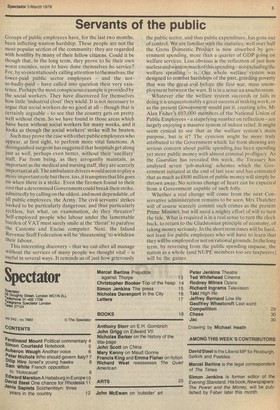Servants of the public
Groups of public employees have, for the last two months, been inflicting wanton hardship. These people are not the most popular section of the community: they are regarded with hostility by many of their fellow citizens. Could it be though that, in the long term, they prove to be their own worst enemies, seen to have done themselves no service? For, by so ostentatiously calling attention to themselves, the lower-paid public sector employees — and the notso-badly-paid — have called into question their very existence. Perhaps the most conspicuous example is provided by the social workers. They have discovered for themselves how little 'industrial clout' they wield. It is not necessary to argue that social workers do no good at all — though that is certainly arguable — to see that the country gets on pretty well without them. So we have found in those areas which have been without social workers for many weeks, and it looks as though the social workers' strike will be beaten.
Such may prove the case with other public employees who appear, at first sight, to perform more vital functions. A distinguished surgeon has suggested that hospitals get along Just as well, perhaps even better, without their 'ancillary' staff. Far from being, as they arrogantly maintain, as Important as the medical and nursing staff, they are scarcely Important at all. The ambulance drivers would seem to play a more important role but there, too, it transpires that life goes on when there is a strike. Even the firemen found to their cost that a determined Government could break their strike, admittedly by calling on the oldest, and most dependable, of all public employees, the Army. The civil servants' strikes looked to be particularly dangerous, and thus particularly reckless, but what, on examination, do they threaten? Self-employed people who labour under the lamentable burden of VAT must surely smile at the 'threat' to paralyse the Customs and Excise computer. Next, the Inland Revenue Staff Federation will be 'threatening' to withdraw their labour.
This interesting discovery — that we can after all manage Without the services of many people we thought vital — is useful in several ways. It reminds us of just how grievously the public sector, and thus public expenditure, has gone out of control. We are familiar with the statistics: well over half the Gross Domestic Product is now absorbed by government spending, more than a quarter of GDP going on welfare services. Less obvious is the reflection of just how useless and wanton much of this spending —not excluding the welfare spending — is. Our whole welfare system was designed to combat hardships of the past, grinding poverty that was the great evil before the first war, mass unemployment between the wars. It is in a sense an anachronism.
Whatever else the welfare system succeeds or fails in doing it is unquestionably a great success at making work, or as the present Government would put it, creating jobs. Mr Alan Fisher's 693,060 members of the National Union of Public Employees — a stupefying number on reflection — are largely enjoying a massive system of indoor relief. It might seem cynical to see that as the welfare system's main purpose, but is it? The cynicism might be more truly attributed to the Government which, far from showing any serious concern about public spending,has been spending yet more public money with almost criminal profligacy. As the Guardian has revealed this week, the Treasury has analysed seven `job-making' schemes which the Government initiated at the end of last year and has estimated that as much as £800 million of public money will simply be thrown away. No serious change of heart can be expected from a Government capable of such folly.
Whether a real change will come from the next Conservative administration remains to be seen. Mrs Thatcher will of course scarcely commit such crimes as the present Prime Minister, but will need a mighty effort of will to turn the tide. What is required is in a real sense to turn the clock back, to return to the Gladstonian principle of economy, of taking money seriously. In the short term times will be hard, not least for public employees who will have to learn that they will be employed or not on rational grounds. In the long term, by reversing from the public spending impasse, the nation as a whole (and NUPE members too are taxpayers) will be the gainer.


































 Previous page
Previous page